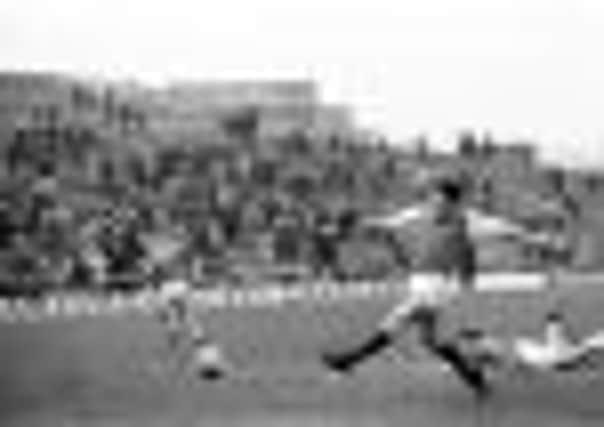Goals and friendliness both came naturally to prolific Joe McBride


Born little more than a long throw-in from Ibrox, he became one of Celtic’s best-loved players of the 1960s, and evoked equal affection at his other clubs – among them Kilmarnock, Motherwell and Hibernian.
Capped only twice by Scotland, he missed out on what would have been the highlight of his career, the 1967 European Cup final, because of injury. Then and for decades after, it was seen as the great misfortune of McBride’s career. But, more recently, he revealed that it was also, in a way, a stroke of good luck, because the eventual diagnosis of what was wrong with his knee revealed cancerous tissue. Otherwise, the illness may not have been caught in time.
Advertisement
Hide AdAdvertisement
Hide AdBy then, McBride was firmly established as one of the most reliable strikers of the post-war era. He had begun his senior career with Kilmarnock, and after two seasons there from 1957 was transferred to Wolves. He quickly moved on to Luton Town and, although he fared reasonably well during his single season there, he never settled in England and, in 1960, returned to Glasgow with Partick Thistle.
It was only when he joined Motherwell two years later, however, that his career really took off. With 51 goals in 88 appearances he inevitably attracted the attention of bigger clubs and, in 1965, he became Jock Stein’s first signing at Celtic.
Even for a manager who was exceptionally shrewd in the transfer market, the £22,000 Stein’s Celtic paid the Steelmen for McBride represented exceptionally good value. The highest scorer in Division One during his first season, he was well on the way to achieving that feat again when, late in 1966, he picked up an injury.
As he sat on the sidelines and watched Celtic beat Inter Milan 2-1 in the European Cup final the following May, McBride may have found some consolation in the fact that the 35 goals he scored in 26 appearances before Christmas had indeed been enough to make him top scorer. But he also derived far greater consolation from the fact that the doctor who had eventually diagnosed his knee injury, Professor Roland Barnes, had possibly saved his life.
Professor Barnes decided to scrape away some loose bone from McBride’s kneecap, and also had the foresight to analyse the matter he had removed. Had the cancer not been detected then, McBride’s career, or possibly even his life, could have ended in that annus mirabilis for Celtic – in which, under the inspired leadership of Stein,
they won every competition they entered.
“I was very lucky, because that was a really early diagnosis,” McBride revealed only a couple of years ago. “If I had played on then I could have died or had my leg amputated.”
Having never regained a regular place in Stein’s all-conquering Celtic team, McBride was sold on to Hibs the following year as a replacement for Colin Stein, who had joined Rangers.
He was a very successful replacement too, scoring 58 goals in just 91 appearances. He left Hibs in 1971, and had brief spells at both Dunfermline and Clyde before retiring the following year.
Advertisement
Hide AdAdvertisement
Hide AdIn later life he was a popular figure at Celtic supporters’ functions, and also worked as an ambassador for the club, whose chief executive, Peter Lawwell, paid tribute to him on the official website. “The passing of Joe McBride is tragic news,” Lawwell told celticfc.net.
“Joe was a very fine man, an absolute gentleman, and someone who gave tremendous service to the club over a number of years.It was a privilege to know Joe and it was fantastic that someone who gave so much to Celtic was still involved with the club in a number of ways. He will truly be sadly missed by everyone at Celtic.”
Hibernian also paid tribute on their website, and reprinted an article from a match programme of 2011 which captured the astonishing impact he made during his first handful of games at Easter Road. “A goal on his debut – a consolation effort as Stein inspired Rangers to a thumping 6-1 win – was followed by an incredible hat-trick against Lokomotiv Leipzig in a Fairs Cup tie,” the article wrote.
“But that feat was bettered in his next match, when he put four past Greenock Morton to make it eight goals in his opening three games as a Hibernian player. . .
“Blessed with a sure touch with both feet, excellent awareness and, even at 5ft 8in, a potent threat in the air, McBride was instrumental in some stirring triumphs for Hibernian. Arguably his finest hour was against his former club Celtic in September 1970, when he delivered two sweetly struck goals that were lionised for many years afterwards.”
McBride left Easter Road shortly after a change of manager. He was 33 at the time, an age thought of as close to retirement in those days, but that performance against Celtic just months earlier had shown that he was far from a spent force.
Yet, for all that he arguably still had a lot to offer Scottish football, McBride did not linger long at Dunfermline or Clyde, and put his conviviality to good use in a new career as a publican.
That same virtue was just as
effective latterly, when he worked for Celtic again, behind the scenes this time. There are many players – some of the greatest among them – who are praised only for their achievements on the pitch, not for their lives away from the game.
Joe McBride was quite different. A man who was regarded fondly for his deeds as a footballer, but if anything remembered with even more affection for his unassuming friendliness.